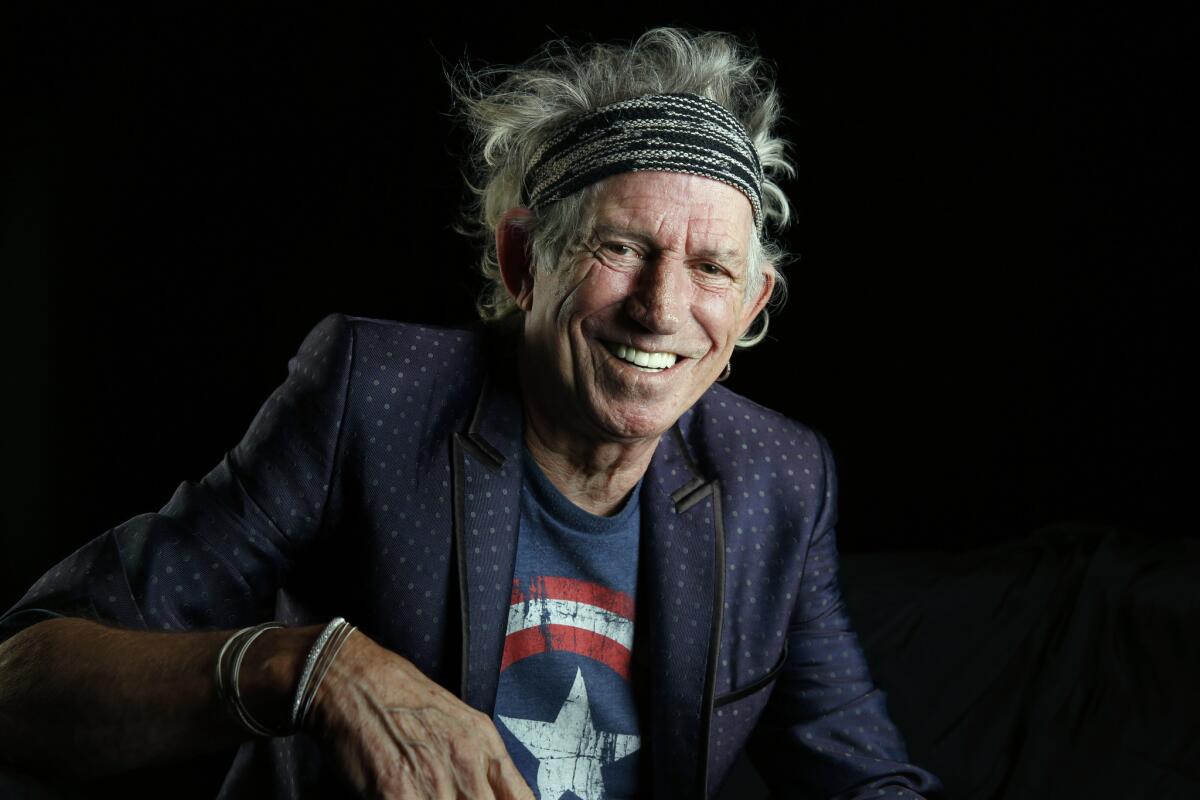With ‘Crosseyed Heart’ dropping, Keith Richards offers a movie counterpoint

Guitarist Keith Richards.
- Share via
Reporting from TORONTO — Near the end of “Keith Richards: Under the Influence,” a new documentary about the Rolling Stones icon, the film’s subject offers a bit of his ironic humor.
“I’m not getting old,” he says with a glint in his eye. “I’m evolving.”
It’s an apt bookend to a piece that starts with the guitarist, walking through the very un-Richardsian precincts of a peaceful garden, remarking with a kind of hard-won wisdom that personal growth continues “until the day they put you six feet under.”
Age and mortality are much on Richards’ mind in the film, though you wouldn’t know it by looking at the musician, who at 71 is as prolific and outspoken as ever.
FULL COVERAGE: Toronto, Telluride and more film festivals
“Under the Influence” had its world premiere at the Toronto International Film Festival on Thursday, with a headbanded Richards coming to town support it. Netflix will make the film available around the world on Friday -- the same day Richards drops his new album “Crosseyed Heart,” his first solo effort in two decades, and one that’s already garnering some strong notices.
Taking the stage after the screening Thursday, Richards, with a mix of swagger and self-deprecation, quipped, “I didn’t know I was that interesting.”
Directed by “20 Feet From Stardom” helmer Morgan Neville, the film is a leisurely, good-natured piece with occasional spikiness — much like Richards himself. The obligatory touches of what might be called the hanging-out music doc (see also under: Davis Guggenheim’s U2 piece “From the Sky Down” and Cameron Crowe’s “Pearl Jam Twenty,” both of which debuted at the festival in past years) are all in place. As Richards chats amiably with the filmmakers and others, there are reminiscences about the early days of the Stones, thoughts about Richards’ choppier solo career and mentions of the collaborations with and inspirations from a range of country, blues and rock musicians.
It’s Richards’ wit that lends the film a distinct flavor. On a confrontation with an irascible Chuck Berry, he deadpans -- “one of Chuck Berry’s greatest hits,” accenting the quip with trademark laughs that suggests he’s just let you in on a fantastic inside joke.
When bemoaning some of the directions rock has moved in since the Stones came on the scene, he said: “I’ll never get tired of rock ‘n’ roll. It’s the rock -- it sounds like a march. I need a little more roll.” (He did not, in person or in the film, address the prospect of a new Stones album, a subject that has captivated fans in recent days after he said in an earlier interview that it was a possibility.)
Neville peppers the film with some of Richards’ philosophical musings. “No one wants to get old but no one wants to die young,” the guitarist says. “You just have to follow it down the path.” At a post-screening Q&A, Richards was asked how he came to be so Zen. “I just am who I am. If I had to think about it, I wouldn’t be me.” Which, of course, is very zen.
Neville said the casual vibe to the film was by design. “I wanted it to feel like a hang --you’re sitting around with Keith talking about life, talking about music, and at the end of it you feel like you’ve gone somewhere even though there’s no distinct arc,” he said at a news conference with Richards earlier in the day.
Central to that trajectory is race. Richards describes in the film how his life changed when he first heard the likes of blues legends such as Robert Johnson and Lead Belly, musicians he and the Stones would pay homage to/liberally borrow from.
SIGN UP for the free Indie Focus movies newsletter >>
Race relations come up frequently in the film, as when the Stones toured through the Deep South during segregation, or via Richards’ latter-career collaboration with Steve Jordan, the versatile musician who has helped anchor Richards’ X-Pensive Winos backing band. Long before a time when black-white music collaborations were common, Richards was pulling them off with ease.
Still, the issue is not always simple. Richards is no fan of rap, making clear at the news conference exactly how he feels about it.
“Blues to me also includes music, not just someone talking to me,” he said. “For me, I need music; I need notes. It doesn’t grab me.” He added: “I don’t want to knock anything. They’re having great fun with it and a lot of people [like it]. I prefer not to hear ‘Mary Had a Little Lamb’ with a bad drumbeat behind it.”
Though less performance-oriented than another Richards-y doc, Martin Scorsese’s Rolling Stones concert pic “Shine a Light,” Neville’s movie is distinguished by the presence of a range of colorful Richards associates. Though Mick Jagger is scarcely in evidence, they include Tom Waits (deep of voice and thought) and Buddy Guy. It is the latter who gets in one of the lines of the film — and perhaps channels the spiritual beliefs of Richards himself — when he explains the art form he helped shape.
“The blues are about the highs and the lows,” Guy said. “And If you haven’t had lows,” he added, “just keep living.”
Twitter: @ZeitchikLAT
More to Read
Only good movies
Get the Indie Focus newsletter, Mark Olsen's weekly guide to the world of cinema.
You may occasionally receive promotional content from the Los Angeles Times.











